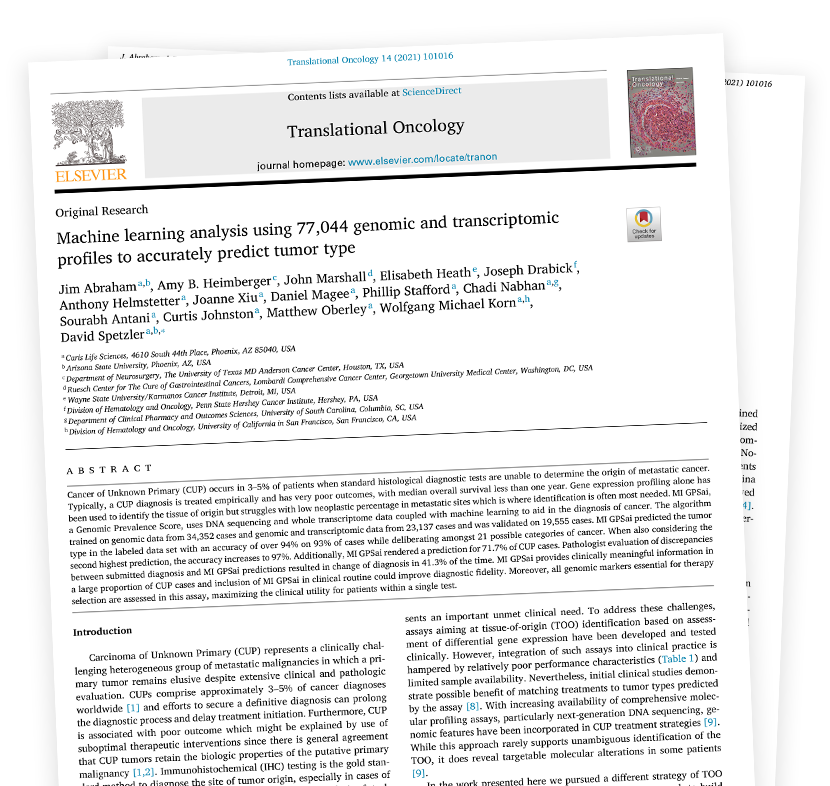Caris GPSai
Identify Tumor Origin and Improve Treatment Decisions with Caris GPSai
Caris GPSai™ analyzes genomic and transcriptomic data to match a tumor’s molecular signature to one or more of 90 cancer categories from the Caris database. Caris GPSai provides additional insight to help oncologists better manage CUP or cases with atypical clinical presentation or clinical ambiguity.
Enhance Diagnostic Confidence with Artificial Intelligence.
Cancer of Unknown Primary (CUP) diagnosis is typically treated empirically and has very poor outcomes, with median overall survival less than one year.1 Caris GPSai, a Genomic Probability Score, uses whole exome (DNA) and whole transcriptome (RNA) sequencing coupled with trained and validated neural networks to aid in identifying the tissue of origin.
Treatment planning relies heavily on accurate cancer type or lineage diagnosis. However, some cancers can present with clinical ambiguity or may be cancers of unknown primary (CUP) which can contribute to discrepancies in diagnosis. Rates of inaccurate diagnosis range from 3-9%2, given the critical nature between diagnosis and therapy decision Caris GPSai plays an integral part in therapy selection and may lead to improved diagnostic accuracy.
The Caris GPSai algorithm was trained and retrospectively validated on over 250,000 cases from the Caris database. The algorithm was then validated prospectively on an additional 3,200 MI Tumor Seek Hybrid™ cases.
How It Works
Caris GPSai can be added to any solid tumor order by selecting the appropriate box on the Caris requisition at no additional cost or added specimen requirements. Results for Caris GPSai will appear in the final Caris report. By comparing the genomic and transcriptomic characteristics of a patient’s tumor to the 90 cancer type signatures, these findings can offer additional insights to make more informed treatment decisions.

Order Caris GPSai
Caris GPSai can be added to any solid tumor order at no additional cost or added specimen requirements by selecting the appropriate box on the Profiling Requisition.

Tumor Analyzed
Caris GPSai analyzes genomic and transcriptomic data to match a tumor’s molecular signature and provides the prevalence of that signature in the Caris genomic and transcriptomic database.

Probability Score Reported
Results are included on the Molecular Profiling Report to help identify the tumor of origin by comparing the molecular characteristics of the patient’s tumor against other tumors in the database.

Read the Caris GPSai Publication
Caris GPSai provides clinically meaningful information in a large proportion of CUP cases and inclusion of Caris GPSai in clinical routine could improve diagnostic fidelity. Moreover, all genomic markers essential for therapy selection are assessed in this assay, maximizing the clinical utility for patients within a single test.
- Massard C, Loriot Y, Fizazi K. Carcinomas of an unknown primary origin–diagnosis and treatment. Nat Rev Clin Oncol. 2011 Nov 1;8(12):701-10. doi: 10.1038/nrclinonc.2011.158. PMID: 22048624
- Peck, M., Moffat, D., Latham, B., Badrick, T., Review of diagnostic error in anatomical pathology and the role and value of second opinions in error preventions, J. Clin. Pathol. 71 (11) (2018) 995-1000.
Discover
More
Caris Molecular AI has one of the largest and most comprehensive databases of combined molecular and clinical outcomes data in the world.
Caris FOLFIRSTai™ is the first clinically validated, AI-powered molecular predictor of chemotherapy efficacy for mCRC patients. Caris FOLFIRSTai is included for mCRC cases at no additional cost, increased turnaround time or added specimen requirements.
Have Questions?
"*" indicates required fields

